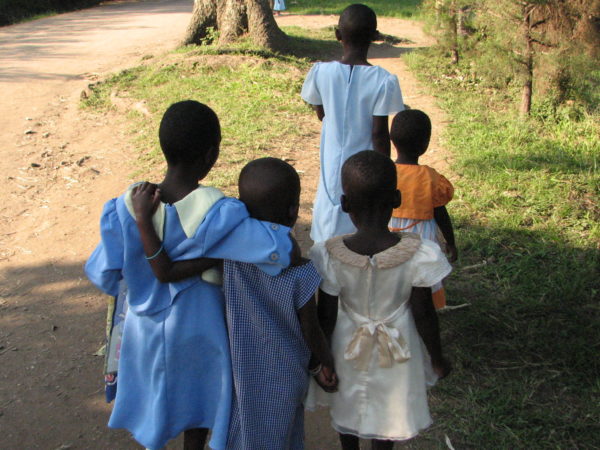Give a warm Carrots welcome to one of my favorite people in the universe, my dear friend of 18 years and fellow writer, Katherine Grimm Bowers! I twisted her arm into writing a post for you for National Sibling Day.-Haley

We were gathered around the bonfire, and our hosts had detected a trend. They couldn’t believe it. We were, one and all, Brits and Americans alike, firstborn or maybe second-born children.
My new husband and I were hanging out at a bonfire in western Uganda, our fire a tiny fleck on a hillside of the lush Rwenzori Mountains. We were gathered with local people and other young expats, many of them medical students volunteering at the hospital down the hill. We were sipping glass bottle sodas, slathered in DEET against the malarial mosquitoes, and making friends a long way from home.
We were the guests of the Bakonzo people, a very rural Bantu tribe in the Ugandan mountains that spill into the Democratic Republic of Congo. And in this tribe, as we were learning, names follow specific conventions related to birth order. Now we were armed with our own, new Bakonzo names. I was Masika, firstborn daughter, my husband Mumbere, firstborn male child.
And most of us expats ended up designated one of these, or Muhindo, the one who changes the gender, if she were a daughter following a firstborn son, or a son following a firstborn daughter. There might be a Biira, second-born daughter, or Bwambale, second-born son. But we foreigners by and large didn’t descend much further down the naming conventions than that.
Compare us with our hosts. Our bishop was Jackson Thembo, fifth born son. And the Lhukonzo language comes equipped for all kinds of naming scenarios: there are twin names, and a name for an eighth daughter, and names to acknowledge that a previous child in the family has died.
At first, filling out patient histories, this tradition perplexed and frustrated us. Family name — our Western last names — is surely a more helpful identification, right? But as I’ve grown older, I’ve begun to see just how much information can be conveyed by birth order names.
In our own lives, now a world away from our kind hosts, we’ve already welcomed three children who would be called as follows: Mumbere, Muhindo, Biira. It is lovely to think of all that my son shares with my husband, each of them firstborn sons, to have my youngest daughter share a name and position with her aunt, Biira Beca. And do you not receive a glimmer of understanding about a girl named Biira, knowing already that she’s a little sister? Or upon learning that this man is the firstborn of his family, with all the mistakes and pressures and extra doting care such a position entails?
By comparison with the Bakonzo tribe, our families are anemic. Who among you is a fourth-born daughter (Mbambu)? Even our middle children are going extinct. As a result, our family ties are weaker. We are tiny islands lacking identities, rather than the robust associations of large, warm, chaotic families.
Certainly, many factors go into prayerfully determining a family’s size, and a faithful family can’t be spotted just by measuring the proportion of pew it commands. Welcoming a Thembo into a family doesn’t automatically connote leveling up in holiness. But we need to remember that the size of a family is not simply a matter of our own preferences and pragmatism. Perhaps more than almost any other factor, siblings will concretely and dramatically affect the childhood our children receive and the people they ultimately become. The Bakonzo recognize this instinctively in their naming practices and in their cheerful openness to life.
The Bakonzo are, by and large, an impoverished people. But they are rich in something that really matters: the siblings that will shape their memories and form their support throughout life. The big families we met on the equator didn’t have an ensuite bathroom for every child or even an easy road ahead in making ends meet. What they did have was an openness to the kind of large family life Kathleen Norris describes as “an atmosphere so dense, warm and lively that I felt as if I had been placed into a den of puppies” (x).
Katherine Grimm Bowers is a Catholic revert and former librarian. She lives in the Shenandoah Valley of Virginia with her husband, John, and their children, where she homeschools her eldest, bakes a mean loaf of sourdough, and helps run her church’s chapter of Blessed is She. You can read more of her work at her blog and on Blessed Is She.

I love this openness to learning from another culture! You can call me Muhindo :; but I am the second eldest of 4 boys and 4 girls. I am lucky to come from a big Catholic network. The Chinese had a naming practice similar to this: family name first, to be prominent, and then given name, but usually referred to by birth/gender order. I read about it in a book “Fifth oldest Chinese daughter” if I have the title right.
I didn’t know about the Chinese! How interesting. And it must be so different in this generation than in past generations, with such (legally mandated) small Chinese families.
Beautiful! Thank you for these wonderful insights!
Thanks, Melissa!
Thank you for the beautiful story, Catherine. My husband likes to call our eight children by their birth order name for fun: first son, second daughter. We get down to six on the daughter side. People of European descent have gotten rid of these comforting and defining names and I think there is a reason for this. These names put a person in a secure but also restricting position in the family and for most people that is perfectly o.k. However, Our Lord has given some of us very specific gifts that may not fit in with the tasks prescribed by our birth order or even our family altogether. I believe most children would be happy to do what their father or mother did but a few possess very specific gifts and are meant to pursue them. The Enemy likes to push us to extremes which is easy because of our fallen nature. When Europeans still had their tight social structure in place, it was abused as a straight jacket making no allowances for people who had different gifts like artists, poets or people with great leadership qualities. I’m sure Our Lord does not dispense these gifts without a purpose which was often denied by a person’s place in society. Thus we rebelled and the rebels came to the New World throwing out the baby with the bath water. We got rid of birth order names and now we are on the slippery slide to the opposite extreme, no place in life, no holds, no family. Let us learn from the Bakonzo but not indiscriminately, only until we reach the golden middle.
What a good point, Christine! An emphasis on birth order can also be confining.
Hi, What some people do not understand is that the Bakonzo names and naming system has maintained the tribe and its people connected especially now that the language and culture rituals are being made obsolete by the trends in learning, technology and globalization. You can call me Masereka the third born son.